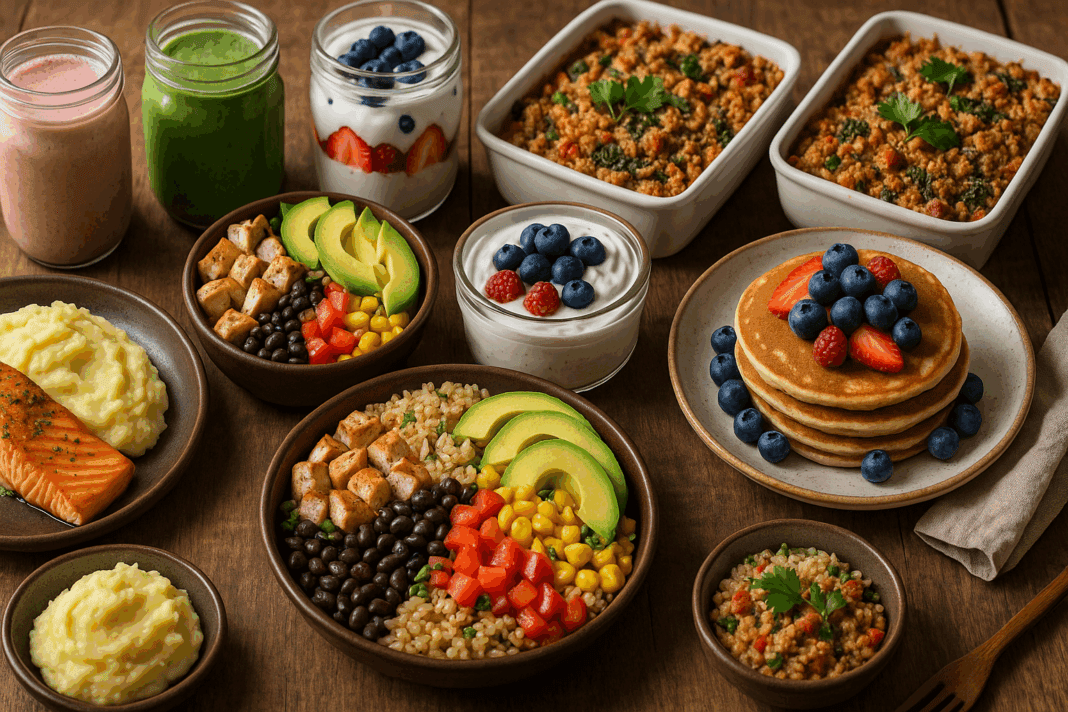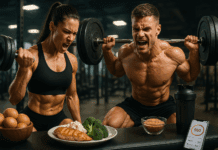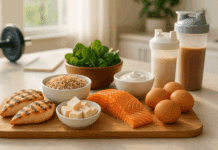Gaining muscle mass requires a strategic balance of intense training, adequate rest, and most importantly, a carefully curated nutrition plan. For many individuals, especially those with a fast metabolism or active lifestyle, consuming sufficient calories is the most significant hurdle in their muscle-building journey. That’s where high calorie meal ideas become indispensable. These meals combine calorie density with optimal macronutrient ratios to promote muscle hypertrophy, accelerate recovery, and support consistent energy levels. This guide delves into 25 muscle-building meals that exemplify the power of a high-protein, calorie-dense approach to nutrition.
You may also like : The Ultimate High-Protein Nutrition Plan: How to Gain Muscle in Women Safely and Effectively
Understanding the Foundation of a Muscle-Gain Diet
Before diving into specific recipes, it’s essential to understand the role of calorie surplus and macronutrient balance in muscle growth. A weight gain food plan is centered around achieving a caloric surplus, where energy intake exceeds energy expenditure. This surplus provides the raw material for muscle synthesis, repair, and performance adaptation. Protein remains a foundational component, as it supplies the amino acids needed for tissue repair. However, fats and carbohydrates play equally vital roles. Fats support hormone production, while carbohydrates replenish glycogen stores and fuel training sessions.
One of the most common questions among those new to hypertrophy-focused nutrition is, “What foods to eat to gain weight and support lean muscle mass?” The answer is multifaceted, emphasizing both whole foods and strategic supplementation. Ideally, a meal program for weight gain should include frequent meals featuring quality proteins, complex carbs, and healthy fats. Individuals often benefit from identifying calorie dense meals that are both satisfying and easy to consume in higher quantities.
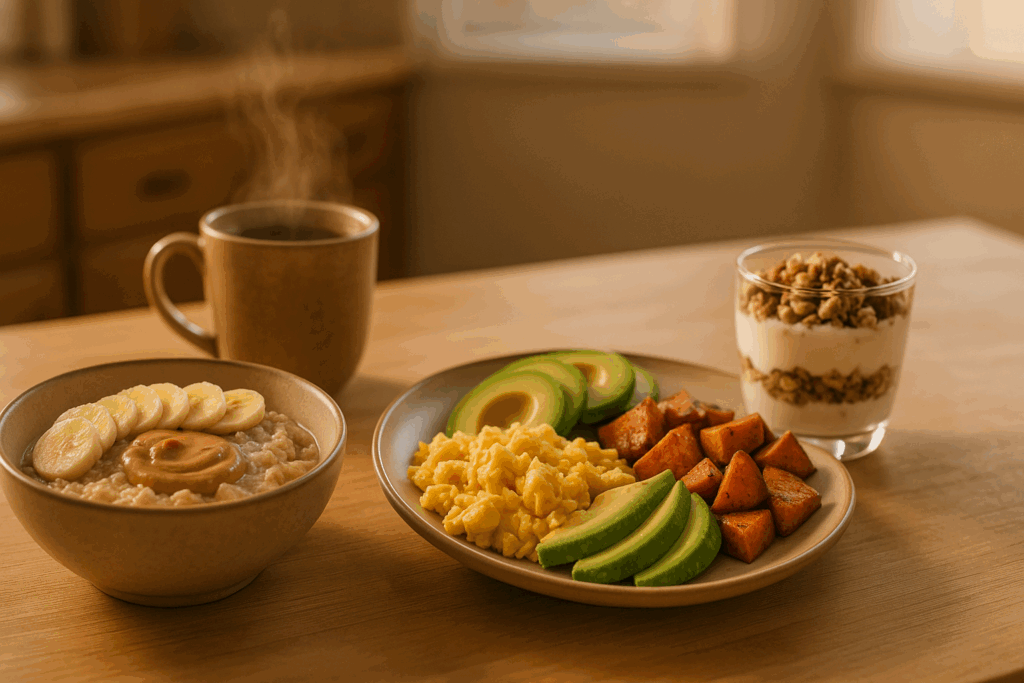
Breakfast Boosters: High Calorie Meal Ideas to Start the Day Strong
Breakfast is often called the most important meal of the day, and for muscle gain, this adage holds true. A powerful breakfast can set the tone for caloric and protein intake, making it a critical opportunity for those trying to increase weight.
One high calorie meal idea for breakfast is a peanut butter banana oatmeal bowl. Cook old-fashioned oats in whole milk, stir in two tablespoons of natural peanut butter, and top with sliced bananas, chia seeds, and a scoop of whey protein. This dish is a prime example of healthy high calorie meals that deliver balanced macronutrients and lasting energy.
Another option is a whole-egg scramble with avocado, cheese, and diced sweet potatoes. Eggs provide complete proteins, while avocado and cheese offer healthy fats that increase caloric density. The sweet potatoes supply complex carbs, making this one of the most effective meals to gain weight first thing in the morning.
Lastly, a Greek yogurt parfait with granola, honey, and mixed nuts can be a delicious and nutritious morning staple. By using full-fat Greek yogurt and a generous serving of granola and nuts, this meal can easily exceed 600 calories while offering ample protein and micronutrients. These healthy meals to gain weight offer variety, taste, and muscular support.
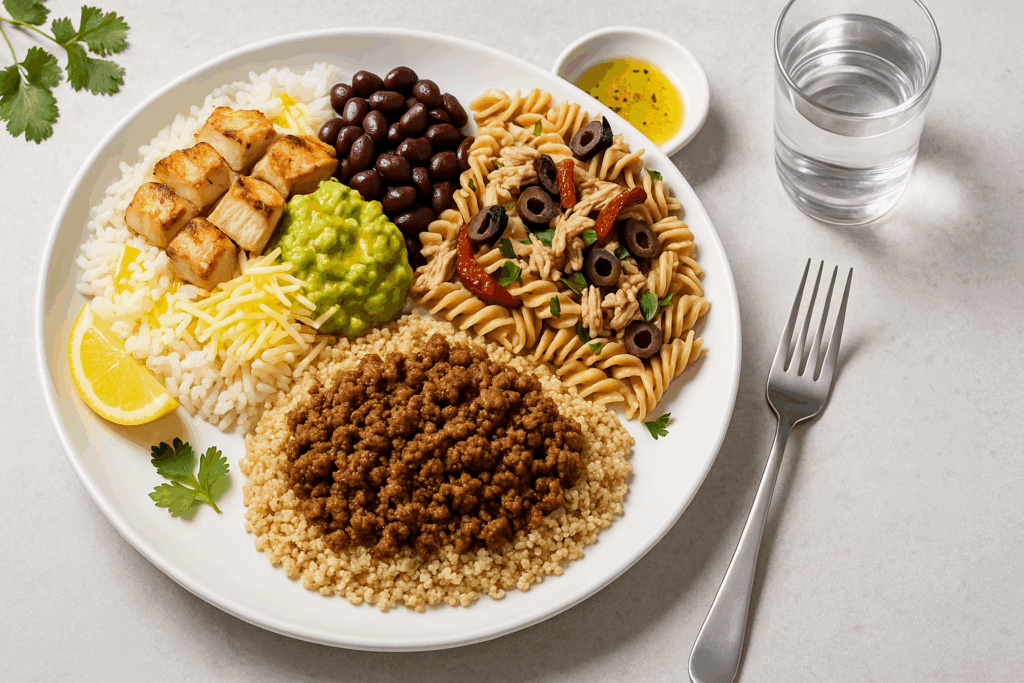
Power-Packed Lunches: Midday Fuel for Muscle Growth
Lunch is often overlooked in diet routines for weight gain, yet it serves as a prime opportunity to fortify daily caloric intake. High calorie lunch recipes should combine lean protein with ample carbohydrates and healthy fats for optimal anabolism.
Consider a chicken and avocado burrito bowl. Layer brown rice, grilled chicken thighs, black beans, guacamole, shredded cheese, and a drizzle of olive oil. Not only does this meal provide over 800 calories, but it also balances fiber, essential fats, and muscle-building protein.
Another great option is a ground beef and quinoa power bowl. Lean ground beef supplies creatine and iron, while quinoa offers complete plant-based protein and slow-digesting carbohydrates. Add roasted vegetables and a tahini dressing to elevate the flavor and nutrient profile.
Tuna pasta salad with olives, sun-dried tomatoes, and olive oil-based dressing is another favorite in high calorie recipes to gain weight. Canned tuna is protein-rich and convenient, while pasta and olive oil add substantial caloric weight. When combined with vegetables and a high-fat dressing, this dish becomes both filling and muscle-supportive.
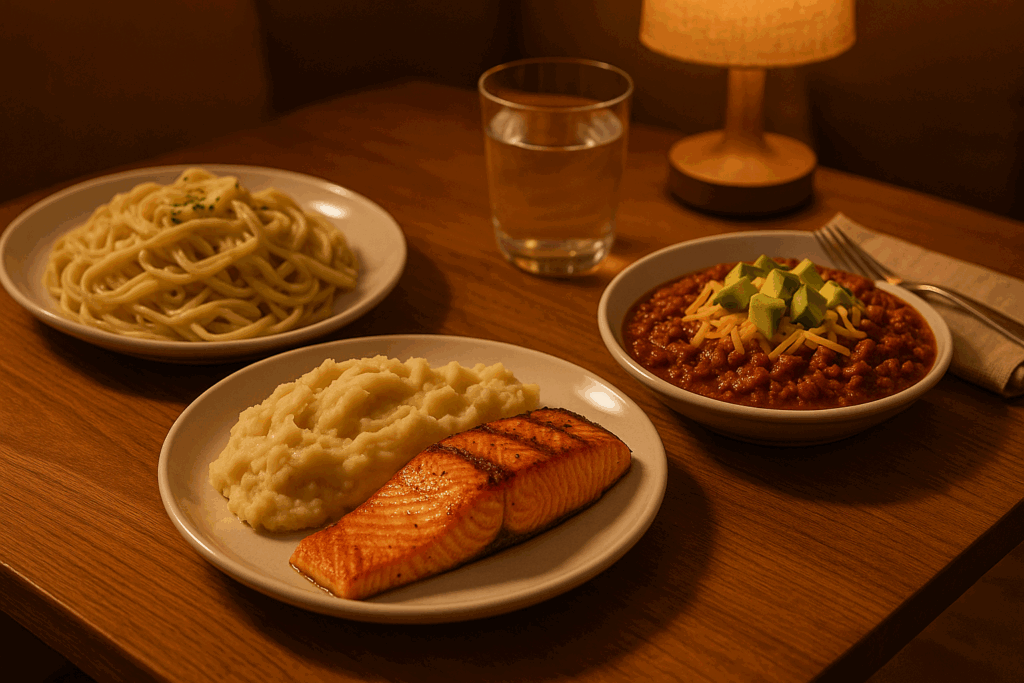
Easy High Calorie Meals for Dinner: Ending the Day with Strength
Dinner serves as a critical recovery meal, especially after a day of physical training. It should be dense in nutrients, satisfying, and aligned with your weight gain food plan. One classic dinner meal is grilled salmon with garlic mashed potatoes and steamed broccoli with butter. Salmon is one of the best foods to help gain weight due to its omega-3 fatty acids and rich protein content. Pairing it with calorie-dense mashed potatoes and buttered vegetables ensures a well-rounded dinner that supports growth and recovery.
A hearty turkey chili with kidney beans, bell peppers, corn, and avocado is another easy high calorie meal. Turkey offers lean protein while beans add fiber and slow-burning carbohydrates. Topping with avocado and shredded cheese enhances both taste and caloric content.
Lastly, try a creamy chicken Alfredo pasta with peas and parmesan. Use heavy cream, whole wheat fettuccine, and a full chicken breast. This indulgent yet balanced dinner packs over 900 calories and delivers everything from muscle-building protein to energy-replenishing carbs. It’s one of the best calorie dense meals to end the day strong.
High Calorie Meal Ideas with Nutrient Synergy
Crafting meals that are not just high in calories but also nutritionally synergistic is key to long-term muscle development. A nutrient-dense diet routine for weight gain focuses on both macro and micronutrients that support metabolic processes, hormonal health, and muscle recovery. One of the most strategic meals in this category is a baked tofu stir-fry with brown rice and sesame oil. Tofu provides plant-based protein and calcium, while sesame oil adds healthy fat and flavor.
For those seeking food to gain weight for females in particular, hormone-friendly ingredients like flaxseeds, leafy greens, and organic poultry should be integrated. One example is a spinach and chickpea curry with coconut milk served over white rice. This meal supports not just muscle gain but also hormonal balance and digestive health.
Another synergistic meal is bison burgers on whole grain buns with cheddar, avocado slices, and roasted carrots on the side. Bison is leaner than beef but still high in protein and iron, making it one of the good foods to gain weight efficiently. The use of whole grain buns and calorie-rich toppings enhances the overall nutrient delivery.
What to Eat to Increase Weight Quickly and Sustainably
Many individuals wonder how to gain weight fast in 1 week or how to gain weight in 7 days at home. While drastic changes in muscle mass take time, optimizing caloric intake through strategic meal timing and meal prep can accelerate progress. Eating five to six meals a day, each with high caloric density and protein, is a proven strategy. For example, one might prepare a beef and rice casserole that can be reheated throughout the week. Including eggs, cheese, cream, and oil in recipes boosts calorie count without increasing meal volume excessively.
Another critical element is the inclusion of snacks that double as small meals. Peanut butter and banana sandwiches, trail mix with nuts and dried fruit, or cottage cheese with jam are all excellent examples. These easy high calorie meals require minimal prep but offer maximal muscle support.
For those asking what should I eat to put on weight, the answer lies in consistent, high-quality, high-calorie meals that support training goals. Consuming foods rich in calories, healthy fats, and complex carbs—like nut butters, sweet potatoes, avocados, and whole grains—can yield significant progress in a short time when combined with resistance training.
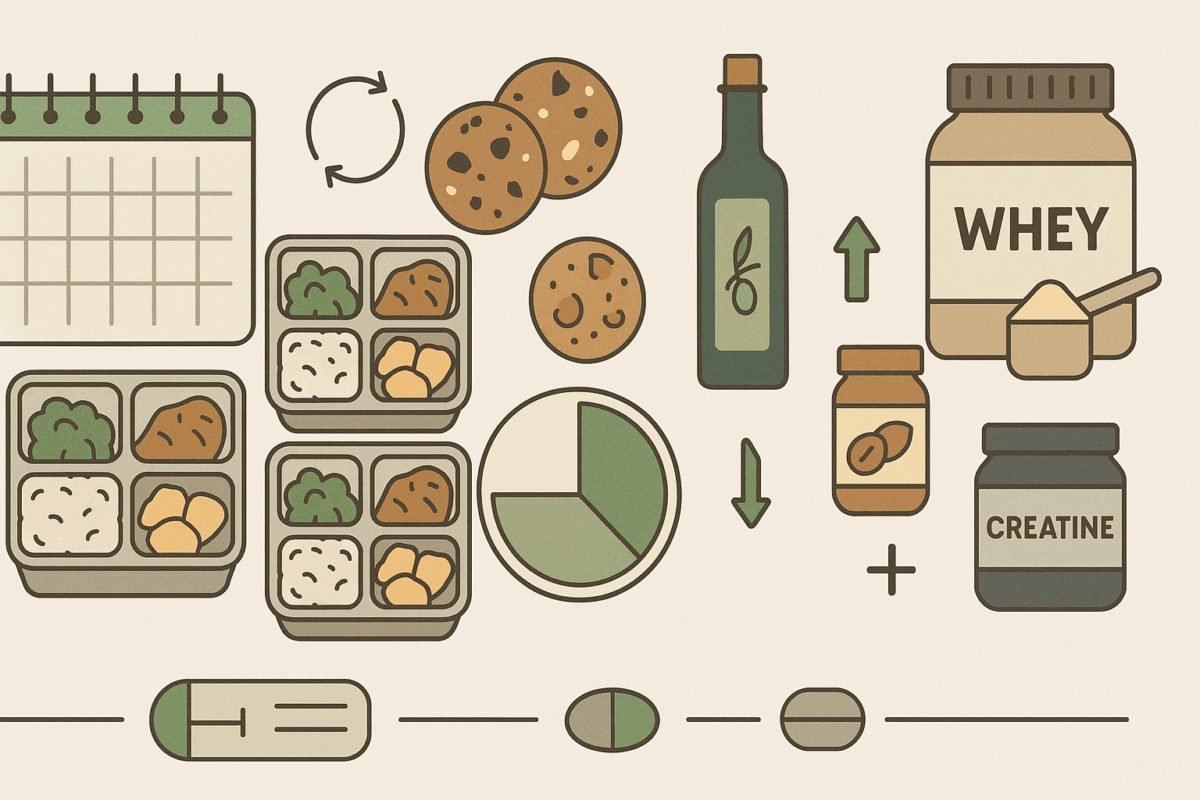
Strategic Meal Program for Weight Gain: Planning and Portioning
Success in muscle-building often depends not only on food choices but also on consistency and strategic planning. A weight gain meal plan should be tailored to the individual’s caloric needs, schedule, and taste preferences. One effective strategy is batch cooking. Preparing meals such as lasagna with beef and ricotta or chicken curry with coconut milk allows for consistent meal access throughout the week.
Another principle of successful planning involves caloric layering. This means adding calorie boosters such as shredded cheese, nut butter, olive oil, and cream to existing dishes. For example, a bowl of chili can be topped with cheese and sour cream to increase its energy content without increasing the serving size significantly.
Supplements to increase weight can also be incorporated as part of the overall structure. High-quality weight gainer shakes, whey protein, and creatine monohydrate can help close the caloric gap and promote muscle synthesis. However, these should complement, not replace, whole foods in a comprehensive meal routine.
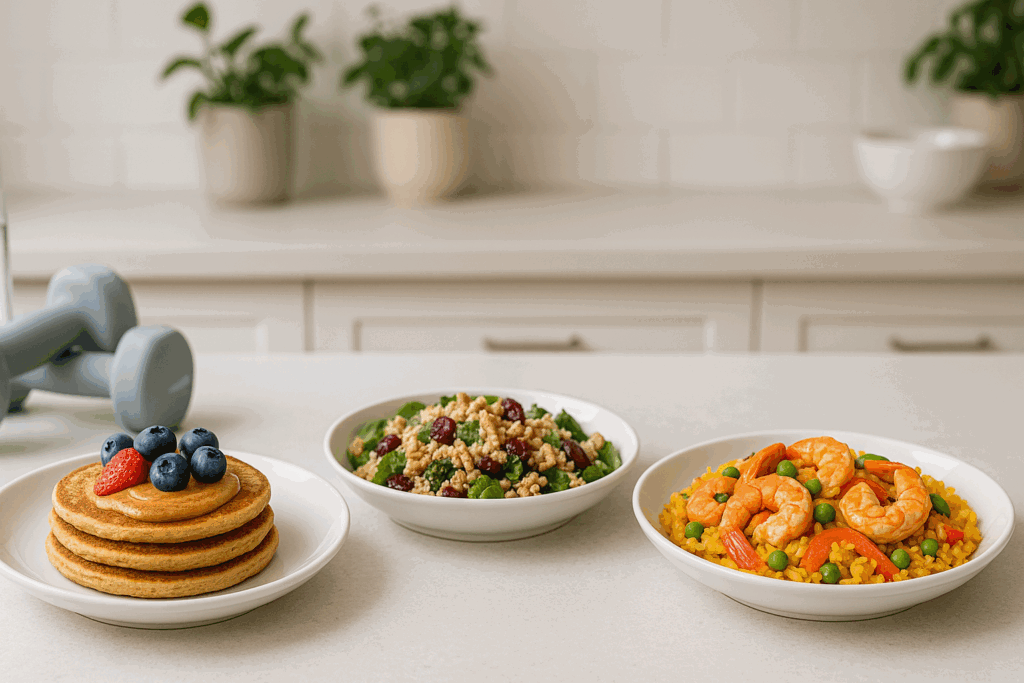
High Calorie Meal Ideas Tailored for Female Athletes
For women aiming to increase muscle mass, high calorie meal ideas must be adjusted to meet unique hormonal and metabolic needs. Female athletes benefit from meals that support both physical performance and hormonal health. A breakfast of protein pancakes made with almond flour, eggs, and whey protein, topped with almond butter and berries, is ideal for this demographic. It balances phytoestrogens, protein, and healthy fats.
A lunch of grilled chicken quinoa salad with olive oil dressing, walnuts, cranberries, and arugula delivers both micronutrients and caloric depth. Each element contributes to muscular development while promoting heart health and inflammation control. Dishes to gain weight for women should not only deliver calories but also promote balanced endocrine function.
For dinner, try a seafood paella made with shrimp, mussels, peas, saffron rice, and olive oil. Seafood offers lean protein and essential omega-3 fatty acids, which are vital for recovery and hormonal balance. Combined with rice and olive oil, the dish delivers over 700 calories per serving, making it one of the most effective healthy foods to gain weight for women.
Supplements and Additions: Enhancing Meals with Extra Calories
No discussion of weight gain foods would be complete without addressing the strategic use of supplements. Good supplements for weight gain include protein powders, mass gainers, omega-3 capsules, and digestive enzymes. They can be added to smoothies, oatmeal, or even baked into protein bars. While whole foods remain the priority, supplements offer convenience and precise macronutrient delivery.
Smoothies serve as a versatile platform for supplementation. A high-calorie shake made with whole milk, banana, oats, peanut butter, and whey protein can deliver over 800 calories in a single serving. Adding a scoop of creatine or collagen peptides enhances muscle recovery while supporting connective tissue health. These drinks can function as meals to put on weight and are ideal post-workout.
Some meal plans also include fortified yogurts, protein-enhanced puddings, and high-fat cheeses. These additions turn standard meals into powerful weight gain foods for women and men alike. Whether preparing breakfast or a bedtime snack, incorporating supplements to increase weight can streamline progress without sacrificing taste or satisfaction.
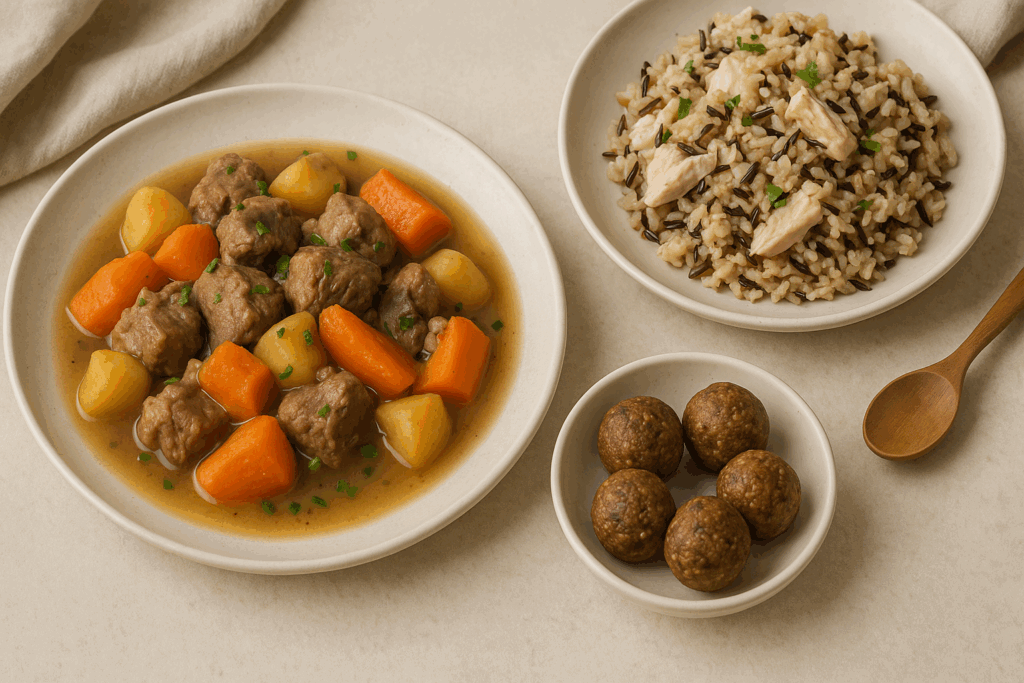
High Calorie Meal Ideas That Prioritize Digestive Comfort
Gaining weight is not only about consuming more food; it’s about doing so comfortably. Many high calorie recipes to gain weight can cause digestive issues if not structured thoughtfully. Meals should include fermented foods, soluble fiber, and digestive enzymes to support gut health.
An example of a gut-friendly meal is lamb stew with potatoes, carrots, and bone broth. The slow-cooked meat and collagen-rich broth are soothing to the stomach, while the vegetables provide fiber. This is a prime example of healthy high calorie meals that nurture the digestive system.
Another comfort-focused option is a wild rice and roasted chicken casserole with broccoli and cheese. Wild rice offers fiber and minerals, while roasted chicken is easier to digest than fried meats. With added cheese and a light cream sauce, the meal becomes one of the top healthy meals to gain weight that’s both gentle and effective.
Nut-based energy bites made with oats, honey, almond butter, and dried fruit can be stored easily and consumed throughout the day. These snacks support digestion while contributing to a consistent caloric surplus, especially when included in a structured weight gain meal plan.
Budgeting and Planning for Calorie-Dense Nutrition
Many people believe that eating a high calorie diet must be expensive, but that isn’t necessarily true. With a little planning, you can create calorie dense meals on a budget. Staples like rice, beans, oats, eggs, and peanut butter are both economical and nutrient-rich.
Buying in bulk and preparing meals at home can save significant money over time. Making large batches of stews, casseroles, or pasta dishes allows you to control ingredients and portion sizes while reducing food waste. Using frozen vegetables and canned legumes ensures availability year-round and keeps meals affordable.
To stay within budget while still hitting your targets, prioritize foods that offer the highest calorie-per-dollar ratio, such as olive oil, whole milk, and pasta. Avoid pre-packaged weight gain foods with inflated prices when you can create superior homemade versions.
Overcoming Appetite Fatigue and Palate Boredom
One real challenge in maintaining a high-calorie diet is appetite fatigue. Eating large meals multiple times per day can become tiresome, especially when food choices are repetitive. Rotating spices, textures, and flavor profiles can reawaken appetite and make the diet more enjoyable.
If you’re eating a lot of rice and chicken, try switching to jasmine rice with Thai curry, basmati rice with Indian butter chicken, or wild rice with roasted duck and cranberry glaze. Even simple ingredients like cinnamon, garlic, cumin, or ginger can radically transform a dish’s taste without altering its caloric value.
Dessert-style meals are also helpful. Protein ice cream, baked protein brownies, or high-calorie chia pudding with coconut milk and maple syrup allow for variety while still meeting nutritional targets.
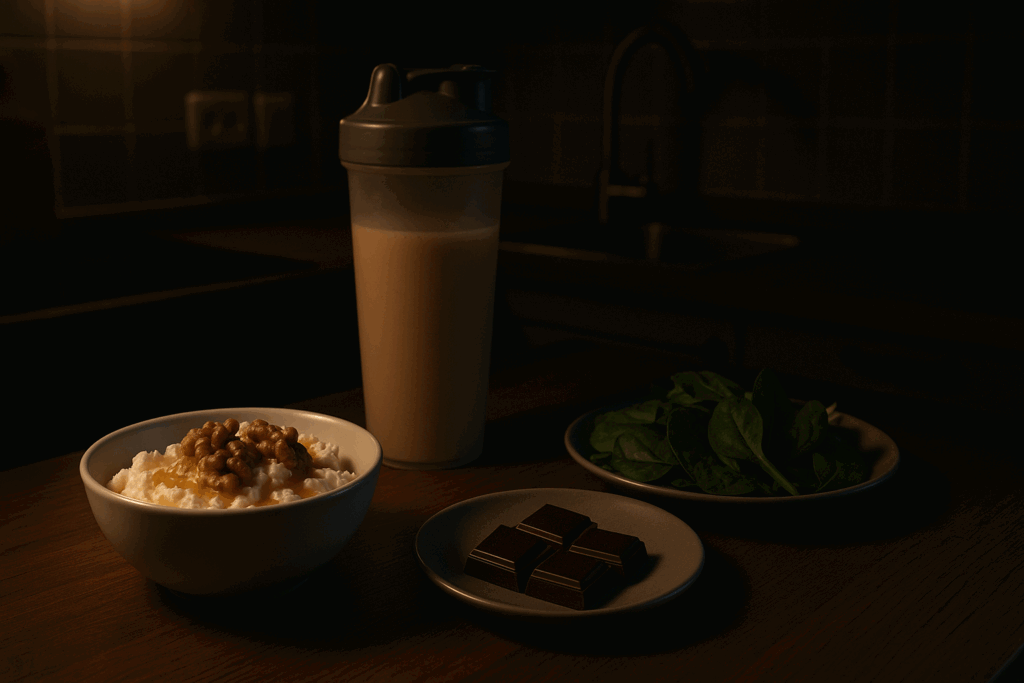
Sleep, Recovery, and Nighttime Meals to Support Muscle Growth
Another often-ignored aspect of a weight gain food plan is the importance of sleep and overnight recovery. Sleep is when growth hormone levels spike, facilitating tissue repair and muscle development. Supporting this process with the right nighttime nutrition can enhance gains significantly.
Casein protein is ideal for pre-bed consumption because it digests slowly, providing a steady amino acid release throughout the night. A bowl of cottage cheese with honey and walnuts, or a casein protein shake with almond milk, makes for a perfect pre-sleep snack.
Adding magnesium-rich foods such as dark chocolate, avocado, or leafy greens to dinner can support sleep quality. Sleep-enhancing nutrients combined with protein slow digestion and improve recovery, making these meals crucial for anyone wondering how to gain weight in a week or less with visible results.
Gender-Specific Considerations: Tailoring High Calorie Meal Ideas for Women
Although the fundamentals of muscle gain apply across genders, women often have unique physiological needs that merit dietary adjustments. Hormonal fluctuations, bone density considerations, and metabolic nuances all affect how women should approach meals to help gain weight.
For example, incorporating calcium-rich foods such as sardines, yogurt, and fortified plant milks is especially important for supporting bone strength in women. Iron is another critical nutrient; therefore, meals including lentils, spinach, beef, or fortified cereals can help prevent deficiencies.
Additionally, many women prefer lighter meals with high calorie density. Instead of heavy casseroles, try buddha bowls made with brown rice, chickpeas, avocado, roasted vegetables, and tahini dressing. This approach is both satiating and nutritionally aligned with female physiology.
What Can I Eat to Gain Weight? Personalized and Practical Answers
The question “What can I eat to gain weight?” is best answered with context: activity level, metabolism, dietary preferences, and health status all influence the answer. For many, the answer lies in calorically fortified versions of familiar foods. Swap skim milk for whole milk, use olive oil liberally in cooking, and opt for full-fat dairy. Pasta dishes, casseroles, and even curries can all be adapted into weight gain foods with the right ingredients and techniques.
One effective technique is layering: adding guacamole to burritos, nut butter to toast, or coconut milk to soups. Another is frequency: eating more often, even if portion sizes remain moderate. Meals to help gain weight don’t need to be enormous—they simply need to be well-composed and frequent enough to establish a surplus.
Ultimately, the best approach involves experimentation. Keep a food log, adjust based on weekly results, and refine as needed. What to eat to increase weight becomes clearer as you gain awareness of your own body’s responses to different meals and nutrient profiles.
Frequently Asked Questions: Expert Strategies for Building Muscle with High Calorie Meal Ideas
1. What are some creative high calorie meal ideas that won’t feel repetitive?
Maintaining dietary variety is essential when following a weight gain meal plan, especially to combat meal fatigue. One strategy is to use international cuisines as a template for high calorie meal ideas. For instance, West African groundnut stew with chicken and rice, Indian butter paneer with naan, or Mediterranean lamb gyros with tzatziki sauce can all be adapted into calorie dense meals that pack flavor and macros. Switching up cooking methods, such as roasting, braising, or grilling, can also transform the texture and taste of core ingredients like chicken, beef, or lentils. Keeping a rotating spice and sauce arsenal, like chimichurri, harissa, or tahini, further boosts sensory appeal while contributing to your overall goal of effective, enjoyable meals to gain weight.
2. How do I adjust my diet routine for weight gain if I’m an athlete training twice daily?
Athletes who train multiple times a day require not only more calories but faster-digesting fuel sources pre- and post-workout. In these cases, spacing out calorie dense meals and utilizing high glycemic carbs can prevent digestive discomfort. Rice, fruit-based smoothies, and white potatoes are good foods to gain weight and replenish glycogen without taxing the digestive system. Post-evening training, a higher-fat, high calorie meal like salmon with coconut rice and avocado can help extend satiety and recovery overnight. Periodic use of supplements to increase weight, such as mass gainers or casein blends, can also provide quick calories between training blocks.
3. What are the best high calorie meal ideas for individuals with limited time to cook?
Time-efficient muscle-building meals can still be highly nutritious. Preparing easy high calorie meals in bulk, like chili, curry, or meatballs with pasta, allows for multiple reheatable servings. Instant rice, canned beans, rotisserie chicken, and pre-cut frozen vegetables serve as excellent staples for assembling healthy high calorie meals in under 15 minutes. Another trick is layering high energy toppings onto simple bases—adding hummus, olive oil, and feta to a microwaved sweet potato, for example. Smoothies also play a vital role, offering endless customization and speed. A banana, peanut butter, whole milk, oats, and protein powder smoothie takes minutes and delivers a full high calorie lunch or snack.
4. How can I structure a weight gain food plan to avoid excessive fat gain?
A well-balanced weight gain food plan should be built on whole foods, strategic macronutrient targets, and consistent tracking. Using lean but calorie-dense proteins like turkey thigh or salmon allows for muscle accrual without unnecessary saturated fat. Prioritize meals to help gain weight that include slow-digesting carbs such as oats, lentils, or brown rice, paired with moderate healthy fats like nuts and avocado. Monitoring weekly weight changes and adjusting caloric intake gradually can prevent large spikes in fat gain. Also, favor meals to put on weight that use minimal added sugars and opt for nutrient-dense choices like quinoa over empty-calorie items such as white bread.
5. Which high calorie recipes to gain weight are suitable for plant-based diets?
Plant-based diets can easily accommodate weight gain goals with thoughtful ingredient combinations. Tempeh stir-fries, black bean and sweet potato burritos, and lentil Bolognese over pasta are effective dishes to gain weight without animal products. Calorie dense meals can be created using coconut milk, tahini, avocado, and nuts as fat sources, while legumes, tofu, seitan, and quinoa provide quality protein. Smoothies made with plant-based protein powders, dates, almond butter, and soy milk can rival their dairy-based counterparts in calorie and protein content. Fortified nutritional yeast and pea-protein-enhanced snacks also help bridge gaps in micronutrients and support healthy meals to gain weight on a vegan meal program for weight gain.
6. What are good supplements for weight gain that won’t interfere with whole-food goals?
Supplements should enhance, not replace, a diet rich in whole foods. Good supplements for weight gain include whey or plant-based protein powders, creatine monohydrate, omega-3 capsules, and mass gainers. These can be incorporated into calorie dense meals like oatmeal or smoothies for added nutritional depth. Creatine, in particular, enhances strength performance and supports lean mass without adding excess body fat. When choosing supplements to increase weight, ensure they are third-party tested and free from excessive fillers or sugars. Used strategically, they can complement meals to gain weight, especially for those with high caloric needs or limited appetite.
7. What foods help to gain weight for females concerned about hormonal balance?
For females, weight gain foods should also support hormonal equilibrium. Focus on healthy fats like flaxseed, avocado, salmon, and full-fat yogurt, all of which provide essential fatty acids that promote estrogen balance. Iron-rich foods such as lentils, spinach, and lean beef prevent fatigue and support metabolic health. Whole grains and legumes stabilize blood sugar, reducing the likelihood of hormonal spikes. High calorie lunch ideas for women might include a quinoa salad with chickpeas, olives, and a tahini dressing or tofu stir-fry with brown rice and peanut sauce. These meals to help gain weight also protect against endocrine disruption and mood imbalances.
8. How do I navigate social situations while following a weight gain meal plan?
Social dining can pose challenges for those on a structured weight gain meal plan. Planning ahead is key—check menus in advance and identify high calorie recipes to gain weight, such as pasta dishes, grain bowls, or creamy risottos. Don’t shy away from asking for modifications, like extra avocado, cheese, or olive oil. Bring portable, high-calorie snacks if attending events with limited food options. Discussing your nutrition goals with friends or family can build support and reduce awkwardness around your food choices. With forethought, maintaining meals to put on weight is entirely possible in any setting without compromising your social life.
9. Can I achieve results with high calorie meal ideas if I have a small appetite?
Yes, people with smaller appetites can still benefit from high calorie meal ideas by focusing on energy density rather than volume. Incorporate calorie boosters like nut butters, oils, and cheese into regular meals to increase total intake without increasing portion sizes. Opt for soft, easy-to-digest meals such as mashed potatoes with butter and salmon or creamy pasta with chicken and peas. Drinking calories is another effective tactic—smoothies, milkshakes, and broths infused with coconut cream can provide dense nutrition with minimal chewing. A gradual approach, increasing portions or adding snacks slowly, can also help expand appetite over time in alignment with a sustainable weight gain food plan.
10. What should I eat to put on weight without compromising cardiovascular health?
Choosing healthy foods to gain weight can support muscle development while preserving heart health. Focus on unsaturated fat sources like avocado, nuts, seeds, and olive oil rather than saturated fats from fried foods or processed meats. Include omega-3-rich options such as chia seeds, flaxseed oil, and fatty fish to reduce inflammation and support vascular function. Emphasize fiber-rich carbohydrates like lentils, barley, and oats to regulate cholesterol and blood sugar levels. High calorie meal ideas that balance macronutrients and micronutrients, such as grilled salmon with quinoa and roasted vegetables, are both heart-healthy and weight-promoting. These strategies allow you to follow a meal program for weight gain that aligns with long-term wellness goals.
Conclusion: Crafting a Sustainable Weight Gain Food Plan
Sustainable muscle gain is not about short bursts of overeating, but about developing a strategic, nourishing, and enjoyable diet routine for weight gain. By incorporating these 25 high calorie meal ideas, individuals can create a weight gain food plan that supports consistent progress, enhances recovery, and aligns with long-term health goals. These meals represent more than just fuel; they represent an opportunity to build strength, endurance, and well-being through informed nutritional choices.
From high calorie lunch options like burrito bowls to protein-packed breakfasts and comfort-focused dinners, the variety and versatility of these recipes make them adaptable to different needs and preferences. With the right planning, supplementation, and consistency, even the hardest gainers can reach their physique goals. What foods to eat to gain weight becomes less of a mystery and more of a daily reality with the right knowledge and preparation.
Whether you’re asking how to gain weight in a week or simply looking to enrich your current meal plan, these strategies and recipes offer an expert-backed, evidence-based approach. By embracing both calorie density and nutritional quality, you can turn your diet into your most powerful tool for transformation.
Further Reading:
Healthy Weight Gain Strategies


